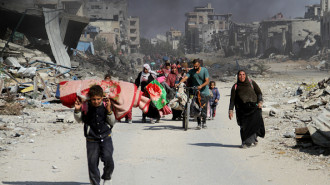Iraq camp closures 'risk homelessness' for over 100,000 refugees
Over 100,000 Iraqis face homelessness as a result of the government closure of displacement camps across the country, an Oslo-based NGO warned on Monday, with the coronavirus epidemic and onset of winter amplifying fears surrounding their plight.
The Norwegian Refugee Council (NRC) said it was "extremely concerned" about the fate of thousands of displaced families living in camps in Iraq's seven provinces, singling out Hammam Al-Alil facility in the country's north.
It said some 600 households had left that camp, which is due to close next week on the instructions of Iraqi authorities.
Tracking done by the International Organisation of Migration (IOM) showed that nearly half of the people forced to leave camps in Baghdad and the southern city of Kerbala in recent weeks were unable to return home.
Many of the refugees were made to return to homes in neighbourhoods which were nearly completely destroyed during the Iraqi military fight back against the Islamic State group.
They also risked being blocked or arrested at checkpoints, due to a lack of adequate paperwork or perceived affiliation with IS and other armed groups.
"Closing camps before residents are willing or able to return to their homes does little to end the displacement crisis," said NRC Secretary General Jan Egeland.
"On the contrary, it keeps scores of displaced Iraqis trapped in this viscous cycle of displacement, leaving them more vulnerable than ever, especially in the middle of a raging pandemic," she added.
Twitter Post
|
Read also: Coronavirus crisis mounting in refugee camps as conditions worsen
Iraqi Prime Minister Mustafa Kadhemi has made tackling the country's displacement crisis one of his main priorities.
Despite Covid-19 slowing departures, the displacement ministry in October vowed to move ahead with camp closures as part of a programme of "safe and voluntary return", The Washington Post report.
The NRC called on the government to inform families of closures at least a month in advance, to give them time to make the necessary arrangements for their return home and facilitate coordination with their areas of origin.
These measures would also minimise the chances of them being turned away at checkpoints and involve humanitarian organisations.
Over six million Iraqis fled their homes during the conflict with IS, which officially ended in December 2017.
Some 1.3 million are thought to be displaced, while over half of the 4.7 million have returned to areas where living conditions are described as "severe", according to the IOM.
Follow us on Facebook, Twitter and Instagram to stay connected
![Hamam Al-Alil [NurPhoto] Hamam Al-Alil [NurPhoto]](/sites/default/files/styles/large_16_9/public/media/images/C599310D-E282-4393-921F-8DC48111314A.jpg?h=d1cb525d&itok=2kbb4uOv)
![Palestinians mourned the victims of an Israeli strike on Deir al-Balah [Getty]](/sites/default/files/styles/image_684x385/public/2024-11/GettyImages-2182362043.jpg?h=199d8c1f&itok=xSHZFbmc)


![The law could be enforced against teachers without prior notice [Getty]](/sites/default/files/styles/image_684x385/public/2178740715.jpeg?h=a5f2f23a&itok=hnqrCS4x)
 Follow the Middle East's top stories in English at The New Arab on Google News
Follow the Middle East's top stories in English at The New Arab on Google News


![Voters in Michigan [Getty]](/sites/default/files/styles/image_330x185/public/2182490468.jpeg?h=a5f2f23a&itok=XMi_sWGX)